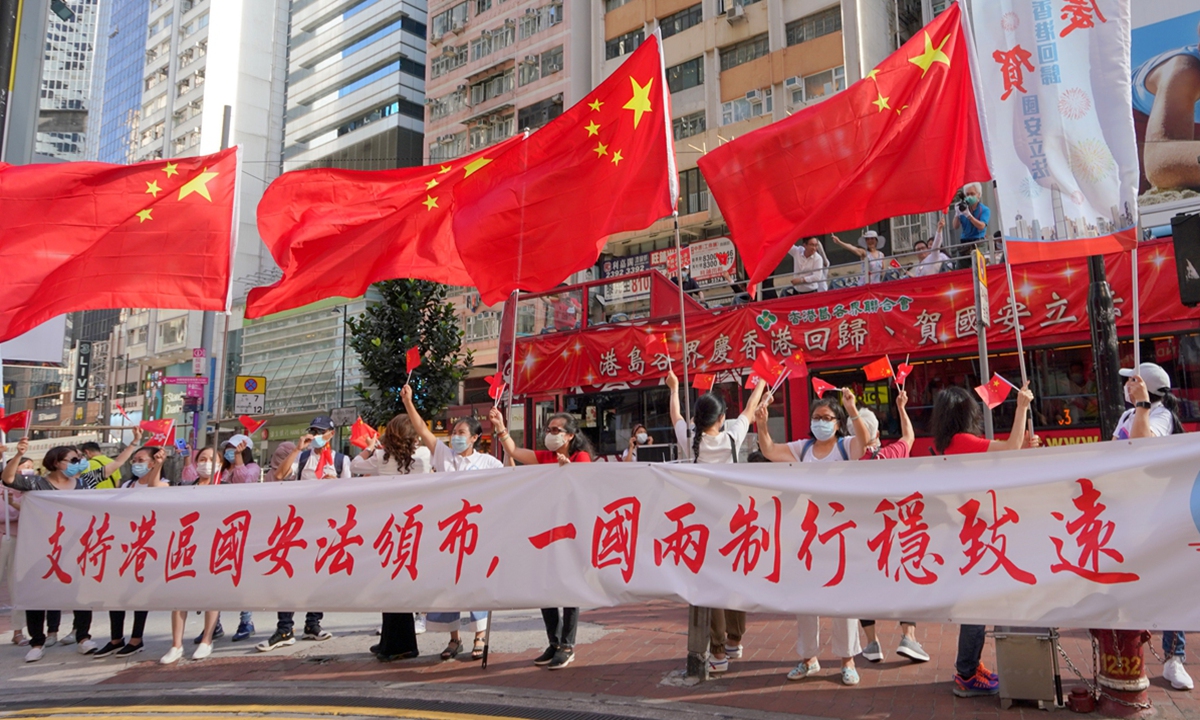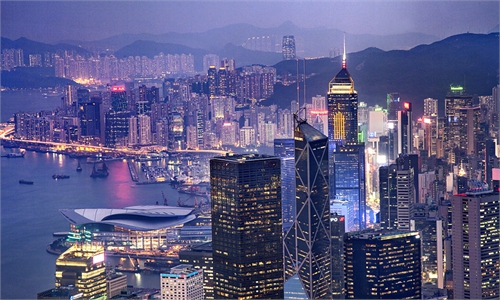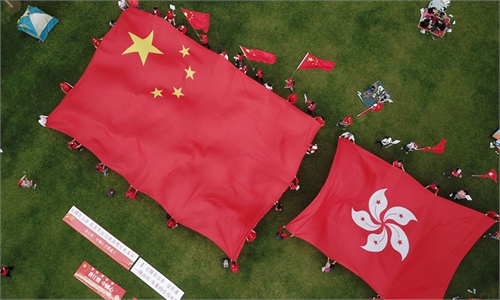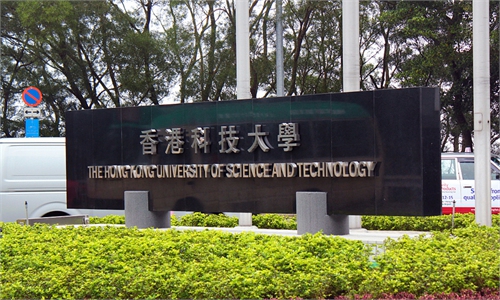
Hong Kong citizens on Tuesday gather to support the National Security Law for Hong Kong. Photo: cnsphoto
Hong Kong's Civil Human Rights Front (CHRF), the biggest opposition alliance in the city, was reportedly scheduled to announce its disbandment at the earliest possible time on Friday. It came as a number of radical anti-government opposition groups and platforms, which had engaged in anti-China and trouble-making movements over the past years, including the secessionist tabloid Apple Daily and the Hong Kong Professional Teachers' Union (PTU), stopped operating.
Experts in both the mainland and Hong Kong hailed those moves as proof of how effective the national security law for Hong Kong and the electoral reform have been for the city, to return to the correct path by cleaning up the mess left by the radical opposition, helping the local government focus on livelihood and social-economic issues, after the city was engulfed by radicals' activities that constantly damaged social stability and national sovereignty in the past two years.
Shortly after the PTU, Hong Kong's biggest teachers' union, announced to disband on Tuesday, the CHRF will hold a meeting on Friday to decide whether to disband the group, according to local media reports. As one of the key opposition groups in Hong Kong established in 2002, the CHRF has been involved in major massive anti-government movements over the past few years such as the illegal "Occupy Central" in 2014 and the anti-extradition bill protests that then turned into months-long social turmoil, which were both considered by experts as a well-plotted color revolution.
Changing city
The CHRF accumulated misdeeds, as it has been repeatedly engaged in radical anti-government movements and incited secession even after the enactment of the national security law for Hong Kong, and has not registered under the Societies Ordinance of Hong Kong. It was also recently probed by the Hong Kong Police Force over its finances, operations and legal basis.
It also actively worked with 25 groups in December 2020 in issuing a joint letter to a UN official as part of its scheme in colluding with international organizations and foreign forces to pressure China over the matter of Hong Kong with human rights issues as a cover. The CHRF was also believed to be closely working with NGOs and external forces in inciting riots during the social turmoil in 2019, according to media reports.
The potentially upcoming dissolution showed the deterrence of the national security law for Hong Kong as well as the determination of the Hong Kong Special Administrative Region government for law enforcement against illegal activities, Lau Siu-kai, vice-president of the Chinese Association of Hong Kong and Macao Studies, told the Global Times on Thursday.
"With the iron-clad will of the central government in ending the social turmoil and political mess in Hong Kong, those anti-China rioters have been losing ground and public support," he said.
Under the national security law for Hong Kong and the electoral reform, the political environment in Hong Kong has significantly changed, paving the way for restoring the social order and lifting the city out of violent protests that have been embedded with the characteristics of the color revolution with the aim of subverting power.
According to media reports, at least 13 organizations have announced dissolution and canceled their accounts on social media platforms in late June and early July - around the first anniversary of the implementation of the national security law for Hong Kong. For example, Hong Kong Shield organized by local singer Anthony Wong Yiu-ming, and Denise Ho, who closely worked with Hong Kong secessionist Joshua Wong during the social turmoil in 2019, also supported the opposition camp. Apple Daily, the secessionist tabloid, also issued its final hard copy in late June, which was seen as a significant event in putting the end of an era when foreign proxies and secessionist forces could recklessly meddle in China's internal affairs by cultivating agents like the paper's founder Jimmy Lai and his media group.
Inevitable disbandment
The CHRF is flawed in its registration, as it does not seek registration under Hong Kong's Societies Ordinance as other organizations do, Tian Feilong, an associate professor at Beihang University's law faculty and a member of the Chinese Association of Hong Kong and Macao Studies, told the Global Times.
"Many of the activities it had engaged in involved receiving money from outside the country. It is also suspected of being involved in money laundering, all of which may be investigated and pursued under local law," Tian said.
According to public information and Hong Kong media reports, the previously disbanded PTU had close ties with another opposition group Hong Kong Alliance in Support of Patriotic Democratic Movements of China (the Hong Kong Alliance) and the CHRF. The key figures of the Hong Kong Alliance and the PTU, Lee Cheuk-yan and Ip Kin-yuen, have always been close and often voiced support for each other.
The PTU has also been involved in alleged illegal activities organized by the CHRF, and has been repeatedly suspected of possible financial dealings. It was not until this year when the Hong Kong Alliance and the CHRF faced possible charges under the national security law for Hong Kong, that the PTU cut ties with them.
While some experts consider the PTU a major supporter behind the two opposition groups -CHRF and the Hong Kong Alliance, which was the organizer of a candlelight vigil on June 4 every year--the dissolution one after another was like "when an influential person falls from power, his hangers-on disperse," Lawrence Tang Fei, a member of the Chinese Association of Hong Kong and Macao Studies, told the Global Times on Thursday.
"Both social and political life can return to normal after these anti-governmental platforms collapsed, and Hong Kong's reputation as 'a city of protests' can finally change," he said.
Legal consequences
As the city's political life entered a new phase under the national security law for Hong Kong and the electoral reform for Hong Kong, some radical political figures and groups could no longer exist in the gray zone, and there was less and less room for them to operate in Hong Kong, so their continued existence and development became less and less meaningful, according to experts.
And some also viewed the consecutive announcements of disbandment of organizations that had caused chaos in Hong Kong as being connected with judicial prosecutions against those anti-China and trouble-making figures.
In March, reports said the CHRF was investigated by the police for allegedly violating the law, and many core member groups, including the Democratic Party and the PTU, scrambled to withdraw from the CHRF and clear their boundaries. Some of the key figures of the CHRF were also arrested for allegedly violating the national security law for Hong Kong.
Two months later, Figo Chan Ho-wun, the convener of the CHRF, received 18 months in jail for organizing an unauthorized assembly on October 1, 2019. The CHRF has since faced a more serious crisis.
However, the dissolution does not mean that the CHRF would be exempted from criminal responsibility, Tang said, noting that it is obvious the group had been challenging "one China, two systems" and indulging Hong Kong-secession forces through their protests and slogans.
Although these organizations try to evade legal liability by dissolving, the dissolution of the organizations will not change the fact that illegal activities will be held accountable by law, Tian noted.
"Their main personnel will still be held accountable in the future in accordance with the law," he said.
Another anti-human, anti-society, and anti-science cult organization Falun Gong also reportedly decided to leave Hong Kong, as local media reported earlier Thursday by citing a Facebook post. But then the group denied it, according to local media reports.
"Sooner or later, it should be suspended, as it would be worried about being held legally accountable. If it does not take the initiative to end its operation, it may be banned according to law," he said.
With all those positive changes in political life, Hong Kong will no longer serve as a hotbed for secessionist groups like in the past two decades, according to observers.




